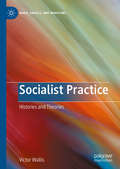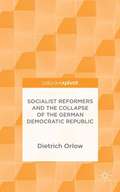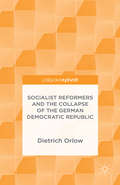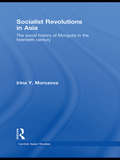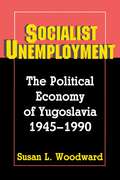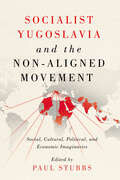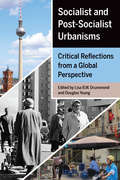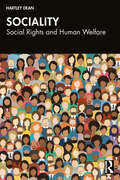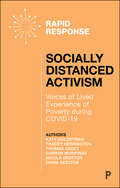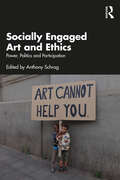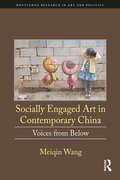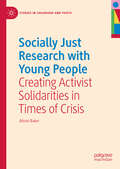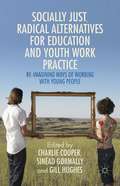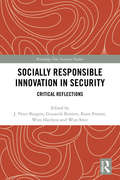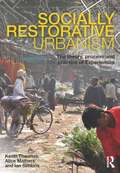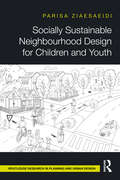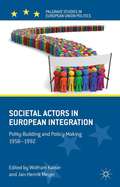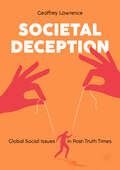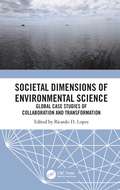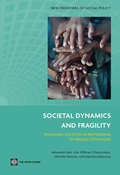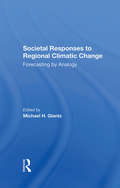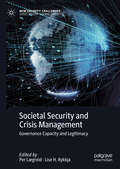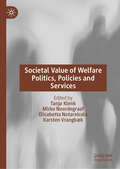- Table View
- List View
Socialist Practice: Histories and Theories (Marx, Engels, and Marxisms)
by Victor WallisThe level of popular discontent—in the United States as elsewhere—has shown a dramatic increase in recent years, but has yet to crystallize into a cohesive anti-capitalist political force. Socialist Practice aims to contribute to a popular movement for socialism. It does so by 1) revisiting, under present conditions, longstanding questions of Marxist theory and revolutionary history, and 2) illustrating the range of issues, activities, and forms of expression that can both inform and be informed by a Marxist approach. Essays spanning a range of national experiences address the crying need to generate a society-wide awakening, grounded in purposeful discussion among all those (the vast majority) whose interests are ill-served by continuation of the status quo.
Socialist Reformers and the Collapse of the German Democratic Republic
by Dietrich OrlowSocialist Reformers and the Collapse of the German Democratic Republic.
Socialist Reformers and the Collapse of the German Democratic Republic
by Dietrich OrlowSocialist Reformers and the Collapse of the German Democratic Republic explores a neglected aspect of the collapse of Communism in the former East Germany. It focuses on the East Germans' enthusiastic support for re-unification and the transfer of West Germany's political and economic institutions to the East, ignoring those in the German Democratic Republic who wanted to 'reform' socialism within, not destroy it. Their aim was to preserve an independent German Democratic Republic that would pursue an alternative 'third way' between Western capitalism and Stalinist repression. Their vision was a 'better, more beautiful' socialism instead of the 'push and shove society' that they associated with Western capitalism. In their view the 'better, more beautiful' socialism would combine the Western ideals of individual freedom with Marxist concept of collective decision-making and shared wealth. The reformers failed, of course, but their ideas and activities in the fall of 1989 are an essential part of the story that led to present-day Germany.
Socialist Revolutions in Asia: The Social History of Mongolia in the 20th Century (Central Asian Studies)
by Irina Y. MorozovaContemporary Mongolia is often seen as one of the most open and democratic societies in Asia, undergoing remarkable post-socialist transformation. Although the former ruling party, the Mongolian People’s Revolutionary Party (the MPRP), has fundamentally changed its platform, it holds leadership and frames nation-building policy. This book re-conceptualises the socialist legacy of Mongolia and explains why in the 1920s a shift to socialism became possible. Furthermore, the role of Mongolian nationalism in the country's decision to ally with the USSR in the 1920-1930s and to choose a democratic path of development at the end of the 1980s is explored.Focusing on social systems in crisis periods when the most radical differentiation in social relationships and loyalties occur, the book describes the transformation of the elite and social structures through the prism of the MPRP cadres’ policy and the party’s collaborations with the Third Communist International and other Soviet departments that operated in Mongolia. Based on original sources from former Soviet and Mongolian archives the author offers a critique of the post-modernist approaches to the study of identity and its impact on political change. This book will be of interest to academics working on the modern history of Central and Inner Asia, socialist societies and communist parties in Asia, as well as the USSR’s foreign policy.
Socialist Unemployment: The Political Economy of Yugoslavia, 1945-1990
by Susan L. WoodwardIn the first political analysis of unemployment in a socialist country, Susan Woodward argues that the bloody conflicts that are destroying Yugoslavia stem not so much from ancient ethnic hatreds as from the political and social divisions created by a failed socialist program to prevent capitalist joblessness. Under Communism the concept of socialist unemployment was considered an oxymoron; when it appeared in postwar Yugoslavia, it was dismissed as illusory or as a transitory consequence of Yugoslavia's unorthodox experiments with worker-managed firms. In Woodward's view, however, it was only a matter of time before countries in the former Soviet bloc caught up with Yugoslavia, confronting the same unintended consequences of economic reforms required to bring socialist states into the world economy. By 1985, Yugoslavia's unemployment rate had risen to 15 percent. How was it that a labor-oriented government managed to tolerate so clear a violation of the socialist commitment to full employment? Proposing a politically based model to explain this paradox, Woodward analyzes the ideology of economic growth, and shows that international constraints, rather than organized political pressures, defined government policy. She argues that unemployment became politically "invisible," owing to its redefinition in terms of guaranteed subsistence and political exclusion, with the result that it corrupted and ultimately dissolved the authority of all political institutions. Forced to balance domestic policies aimed at sustaining minimum standards of living and achieving productivity growth against the conflicting demands of the world economy and national security, the leadership inadvertently recreated the social relations of agrarian communities within a postindustrial society.
Socialist Yugoslavia and the Non-Aligned Movement: Social, Cultural, Political, and Economic Imaginaries
by Paul StubbsAfter a summit in Belgrade in September 1961, socialist Yugoslavia, led by President Josip Broz Tito until his death in 1980, initiated a movement with states in the Global South. The Non-Aligned Movement not only offered an alternative to the Cold War polarization between NATO and the Warsaw Pact but also expressed the hopes of a world emerging from colonial domination.Socialist Yugoslavia and the Non-Aligned Movement investigates the Non-Aligned Movement both as a top-down, interstate initiative and as a site for transnational exchange in science, art and culture, architecture, education, and industry. Re-invigorating older debates by consulting newly available sources, the volume challenges studies that marginalize the role of socialist Yugoslavia in the Non-Aligned Movement. Contributors address topics such as women’s involvement, antifascism and anti-imperialism, cultural and educational exchange, tensions in Yugoslav diplomacy, competing understandings of economic development, the role of the Yugoslav construction company Energoprojekt, Yugoslav relations with Latin America and Africa, and contemporary support for refugees and asylum seekers as a kind of practical and affective afterlife of Yugoslavia’s non-aligned commitments. Socialist Yugoslavia and the Non-Aligned Movement offers an innovative approach to one of the twentieth century’s most important international movements and confronts issues of economic, social, and cultural rights that remain relevant today.
Socialist and Post-Socialist Urbanisms: Critical Reflections from a Global Perspective (G - Reference,information And Interdisciplinary Subjects Ser.)
by Douglas Young Lisa B DrummondSocialist cities have special qualities which endure in particular, subtle, and often under-theorized ways. This book engages with socialism on a global scale, as well as the variety of socialist urbanisms and post-socialist urbanisms, and the range of ways in which globalization intersects with changes in socialist and post-socialist cities. Offering a unique international comparative focus, the book’s fourteen case studies from Asia, Europe, Latin America, and Africa are grouped under three main themes: housing experiences and life trajectories, planning and architecture, and governance and social order. Featuring contributors from a range of disciplinary backgrounds and research foci, Socialist and Post-Socialist Urbanisms brings together a collection of essays on cities that are often overlooked in mainstream urban studies.
Sociality: Social Rights and Human Welfare
by Hartley DeanThis book develops a very particular concept of sociality: a holistic way of understanding how human beings have come to care about and collectively provide for their welfare as a species and to recognise each other’s needs in terms of shared social rights. It tells not so much a success story as a hopeful story. It provides a new way of looking at how our rights to life’s essentials have been in the past, are now and can in the future be understood. It is, potentially, a book for anyone interested in the human condition but will be especially interesting for those engaged in human service provision, community action, social development, welfare law and political debate, and particularly useful to students of social policy and human rights.It is a radically revised edition of Social Rights and Human Welfare, first published in 2015. It provides modified, re-organised and updated versions of chapters from that book while offering a wholly new underlying narrative through which further to develop and apply the author’s alternative theory of social rights. It is a book about the connections between social rights and human welfare; between theory and practice; between debate and reality in the spheres of human service provision and human livelihoods.
Socially Distanced Activism: Voices of Lived Experience of Poverty During COVID-19
by Katy Goldstraw Tracey HerringtonHow would your experience of the COVID-19 pandemic have been different if you had no access to the internet? The APLE Collective - a group seeking to eradicate poverty – rooted their pandemic activism in expertise held by those with lived experience of poverty. This resulted in the decision to campaign against the exclusively digital response to the crisis and the alienation of people in poverty. Drawing on case studies from Thrive Teeside, ATD Fourth World and Expert Citizens (APLE Collective organisations), this book interrogates the term ‘lived experience’. It critically investigates how knowledge gained from lived experiences of poverty is integral to developing effective COVID-19 policy responses.
Socially Engaged Art and Ethics: Power, Politics and Participation
by Anthony SchragBringing together artists, curators, activists, academics, managers, and educators from around the world, this unique anthology examines the notion of ethics within socially engaged art. The volume aims to deepen conversations around what ‘good’ or ‘right’ activities could be in this developing and expanding practice, and readers are invited to consider the contextual nature of socially engaged art – its politics, infrastructures and values. Supported by case studies from the United Kingdom, the United States, China, Cuba, South Africa, and Norway, as well as discussions relating to education, cultural policy, and activism, this volume provides a much-needed critical analysis in the making, curating, commissioning and managing of socially engaged art. This collection is an ideal text for interdisciplinary courses that place visual arts (including design or performance) within social and political contexts but also for students and scholars of art, art history and visual studies more generally.
Socially Engaged Art in Contemporary China: Voices from Below (Routledge Research in Art and Politics)
by Meiqin WangThis book provides an in-depth and thematic analysis of socially engaged art in Mainland China, exploring its critical responses to and creative interventions in China’s top-down, pro-urban, and profit-oriented socioeconomic transformations. It focuses on the socially conscious practices of eight art professionals who assume the role of artist, critic, curator, educator, cultural entrepreneur, and social activist, among others, as they strive to expose the injustice and inequality many Chinese people have suffered, raise public awareness of pressing social and environmental problems, and invent new ways and infrastructures to support various underprivileged social groups.
Socially Just Research with Young People: Creating Activist Solidarities in Times of Crisis (Studies in Childhood and Youth)
by Alison BakerThis book bridges the fields of critical youth studies, community psychology, and sociology to offer a transdisciplinary analysis of youth voice, participation, and activism, as well as of creative and inclusive knowledge-making practices. Presented in three parts, the book traces our journey of praxis as we documented the narratives and testimonies of young people and then mobilised this knowledge to co-imagine and co-create a Youth Participatory Action Research (YPAR) collective aimed at fostering connection and healing during the stringent lockdowns of 2020 in Victoria, Australia. Community building and art-making became central to memorialising their experiences of grief and loss, whilst also opening up new ways of seeing, being and doing. With no end in sight to our current coalescence of crises, this book serves as an invitation to those working alongside young people to consider what we must carry with us if we are to reimagine and remake our world.
Socially Just, Radical Alternatives for Education and Youth Work Practice: Re-Imagining Ways of Working with Young People
by Charlie Cooper Sinéad Gormally Gill HughesChallenging dominant discourses in neoliberal marketized societies about working with disconnected young people, this book argues that alternative, radical approaches to formal and informal education are necessary to challenge repressive practices, and to help build a more equal, socially-just society.
Socially Responsible Innovation in Security: Critical Reflections (Routledge New Security Studies)
by Genserik Reniers Koen Ponnet J. Peter Burgess Wim Hardyns Wim SmitThis book examines the possibility of socially responsible innovation in security, using an interdisciplinary approach. Responsible innovation in security refers to a comprehensive approach that aims to integrate knowledge related to stakeholders operating at both the demand and the supply side of security – technologists, citizens, policymakers and ethicists. Security innovations can only be successful in the long term if all the social, ethical and ecological impacts, and threats and opportunities, both short term and long term, are assessed and prioritized alongside technical and commercial impacts. The first part of this volume focuses on security technology innovation and its perception and acceptance by the public, while the second part delves deeper into the processes of decision-making and democratic control, raising questions about the ethical implications of security ruling. This book will be of much interest to students of critical security studies, sociology, technology studies and IR in general.
Socially Restorative Urbanism: The theory, process and practice of Experiemics
by Kevin Thwaites Alice Mathers Ian SimkinsThe need for a human-orientated approach to urbanism is well understood, and yet all too often this dimension remains lacking in urban design. In this book the authors argue for and develop socially restorative urbanism – a new conceptual framework laying the foundations for innovative ways of thinking about the relationship between the urban spatial structure and social processes to re-introduce a more explicit people-centred element into urban place-making and its adaptation. Focusing on this interplay between humans and the built environment, two new concepts are developed: the transitional edge – a socio-spatial concept of the urban realm; and Experiemics – a participative process that acts to redress imbalances in territorial relationships, defined in terms of the awareness of mine, theirs, ours and yours (MTOY). In this way, Socially Restorative Urbanism shows how professional practice and community understanding can be brought together in a mutually interdependent and practical way. Its theoretical and practical principles are applicable across a wide range of contexts concerning human benefit through urban environmental change and experience, and it will be of interest to readers in the social sciences and environmental psychology, as well as the spatial planning and design disciplines.
Socially Sustainable Neighbourhood Design for Children and Youth (Routledge Research in Planning and Urban Design)
by Parisa ZiaesaeidiSocially Sustainable Neighbourhood Design for Children and Youth explores social sustainability in neighbourhood design, with a particular focus on providing practical design recommendations to improve the lives of children and youth. This book provides insights from research, as well as practical, actionable design principles and strategies to create inclusive, child-and youth-friendly environments that foster social connections and community engagement.The book strongly emphasises how vibrant, engaged communities are linked to equity and long-term social and environmental sustainability. It explores how children and youth perceive social sustainability and the behaviour settings that support it. It outlines design principles and recommendations useful for creating spaces that prioritise their wellbeing and development, both as individuals and as community members. By addressing the unique needs and perspectives of young people, the book empowers urban professionals to develop neighbourhoods that are socially sustainable, inclusive, and resilient. It also touches on important topics like decolonisation, post-colonialism in design, co-design principles, and democratic design approaches and evaluates how current urban planning practices impact the design of spaces for young people.This book is an essential resource for urban planners, designers, architects, and landscape professionals who are committed to designing neighbourhoods that foster social connection, inclusivity, and sustainable community life – especially through meaningful children and youth engagement.
Sociative Logics and Their Applications: Essays by the Late Richard Sylvan (Routledge Revivals)
by Graham Priest Dominic HydeThis title was first published in 2003. Richard Sylvan died in 1996, he had made contributions to many areas of philosophy, such as, relevant and paraconsistent logic, Meinongianism and metaphysics and environmental ethics. One of his "trademarks" was the taking up of unpopular views and defending them. To Richard Sylvan ideas were important, wether they were his or not. This is a book of ideas, based on a collection of work found after his death, a chance for readers to see his vision of his projects. This collected works represents material drafted between 1982 and 1996, and the theme is that a small band of logics, namely pararelevant logics, offer solutions to many problems, puzzles and paradoxes in the philosophy of science.
Societal Actors in European Integration
by Wolfram Kaiser Jan-Henrik MeyerContributors to this volume outline how societal actors have been closely involved in European integration from the founding of the EU to the Maastricht Treaty. Based on newly accessible sources, the authors discuss the participation of political parties, business groups and civil society organizations in European polity-building and policy-making.
Societal Deception: Global Social Issues in Post-Truth Times
by Geoffrey LawrenceThis book provides a comprehensive overview of ‘societal deception’ - how and why people are deceived and led to believe fake news. Coherently blending critical political economy and sociology, the author provocatively examines how corporations, political parties, the media, think tanks and assorted 'influencers' seek to manipulate public opinion to achieve their goals. This book spans an array of contemporary topics and issues not normally tackled by a single writer – the media, genetic engineering, fast food, environmental pollution, climate change, economic inequality, political manipulations, sports, and religion. While critical in subject matter, and replete with easily accessible and reliable sources, this book is highly readable and entertaining for the general as well as academic audience interested in current global issues.
Societal Dimensions of Environmental Science: Global Case Studies of Collaboration and Transformation
by Ricardo D. LopezSocietal Dimensions of Environmental Science: Global Case Studies of Collaboration and Transformation, brings together several key examples of the successes and the challenges that exist for environmental stakeholders trying to strike a balance between science and the societal implications of the issues involved. This book provides important methods and approaches necessary for informed decision making and a better understanding of the common threads of learning, collaboration, negotiation, and compromise. It also explains that concepts and skills needed to better understand how specific project goals can be best achieved in the rapidly changing field of environmental management, by providing practical situations and solutions, across a global landscape. This book provides anyone who works in a community setting with the necessary tools and strategies for solving environmental problems and achieving the goals of an environmental project of any type and specifically addresses the topic of how to synthesize community engagement and the environmental science. It describes current environmental issues and lessons learned of what works and what doesn’t work in real situations, and why. It also highlights key examples, which can be used by both management practitioners and research scientists in their specific circumstances. Showcasing a unique compilation of the diverse and specific examples from societies in Asia, Oceania, North America, and the Middle East, with an equally diverse array of authorship, this book serves all policy makers, scientists, organizers, and community members that desire to build better group dynamics for addressing environmental issues.
Societal Dynamics and Fragility: Engaging Societies in Responding to Fragile Situations
by Alexandre Marc Alys Willman Ghazia Aslam Michelle Rebosio Kanishka BalasuriyaToday's world is changing at breakneck speed, shaking the very foundations of many societies. Increased mobility through massive urbanization and migration allows people unprecedented access to different cultures and ideas; advanced technologies speed the pace of human interaction; the globalization of communication offers new forms of social relationships that may directly contradict traditional norms for behavior. These changes create tremendous stresses on relationships in societies - affecting the way youth interact with their elders, the way women and men relate to each other, how urban migrants and refugees relate to their new environments, and so on. The impacts of these changes are felt acutely in 'fragile' situations, where groups and institutions struggle to adapt to the stresses of rapid social change. In the worst cases, where fragility has given way to open violence - people are more than twice as likely to be malnourished, more than three times as likely to be unable to send their children to school, twice as likely to see their children die before age five, and more than twice as likely to lack clean water. In addition to these domestic challenges, the costs of fragility often spill over to neighboring regions in the form of trafficking in illegal goods and persons, corruption, and violence. 'Societal Dynamics and Fragility' frames a fresh approach to these challenges, by focusing on improving relationships across groups and institutions in society. Drawing on case studies from Yemen, Central African Republic, Haiti, Liberia and Aceh (Indonesia), the book provides a framework for understanding and healing the social divides that often get in the way of building capable institutions and exiting from fragility.
Societal Responses To Regional Climatic Change: Forecasting By Analogy
by Michael H GlantzThis volume is an outgrowth of a project undertaken by the Environmental and Societal Impacts Group (ESIG) for the U.S. Environmental Protection Agency's Office of Policy Analysis to identify societal responses to extreme climate-related events in North America.
Societal Security and Crisis Management: Governance Capacity and Legitimacy (New Security Challenges)
by Per Lægreid Lise H. RykkjaThis book studies governance capacity and governance legitimacy for societal security and crisis management. It highlights the importance of building organizational capacity by focusing on the coordination of public resources and underscores the relevance of legitimacy by emphasizing the importance of public perceptions, attitudes, and trust vis-à-vis government arrangements for crisis management. The authors explore several cases and identify relevant dimensions concerning performance, capacity and legitimacy across different countries. It is an ideal volume for audiences interested in public administration, public policy, crisis management and security studies.
Societal Self-empowerment in Germany: A Comparison of Fridays for Future and Corona Skepticism
by Reimut Zohlnhöfer Peter Kirsch Hanno KubeMost recently, various groups have drawn attention to their political causes by demonstratively breaking the law, whether it is violating compulsory education in Fridays for Future demonstrations or refusing to abide by pandemic containment measures among critics of the Corona policy. This book explores what lies behind these rule-breaking events: supporters of the Fridays for Future movement, while dissatisfied with climate policy, are well integrated into the political system; people who may not abide by Corona rules, on the other hand, sometimes exhibit considerable alienation from and distrust of the political system.
Societal Value of Welfare Politics, Policies and Services
by Mirko Noordegraaf Tanja Klenk Elisabetta Notarnicola Karsten VrangbækWelfare state governance is about tackling social issues, empowering citizens, and adding societal value. It is also about improving public health and quality of life, alleviating inequality, and reducing social polarization. Bringing together researchers from around the world, this volume examines how politics, policies and services contribute to the strengthening of societal value. It assesses the societal impact of policies and professional actions, the ways in which social inequalities and dependencies are traced, and how policies and professional services respond to new societal challenges. It also considers what arrangements enable policies and services to generate more value, and the ways in which politicians, policymakers, public executives, public managers, professionals and employees prepare for this. Comparative and interdisciplinary in nature, this volume will appeal to all those interested in public administration, political science and sociology.
